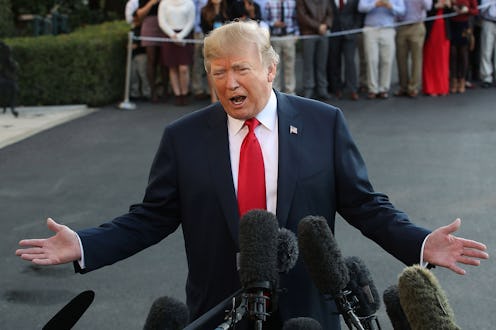News
The Hypocrisy Behind Trump Calling The Texas Shooting A "Mental Health Problem"

In his second response to the recent atrocity in Sutherland Springs, Texas on Sunday, Trump called the Texas church shooting a mental illness problem, rather than a guns issue. There are serious problems inherent in that statement — like the stigma it thrusts on the millions of people who suffer from mental illness, for example. But it's also important to recognize that during his short time in office, Trump has also made it easier for severely mentally ill people to buy guns.
The issue of 'mental health' is a clear red herring used by gun lobby-funded politicians to avoid taking the responsibility to end gun violence that their constituents are demanding.
The president has managed to roll back quite a few of Obama's decisions. One of those was a law preventing people who were too mentally ill to manage their own disability benefits from buying guns.Trump signed a repeal of that law at the end of February. It had required the Social Security Administration to pass the names of some disability payment recipients on to the national gun background check system, but only if those people were both completely unable to work because of their mental illness and thus on full disability benefits because of it and also unable to manage those disability payments without the help of another person. The law had a very limited reach — at most, only about 75,000 would have been affected, according to CNN, and even those people would have been able to request an exception with proof that they wouldn't be a danger to themselves or to society.
Even this, however, was too much of a restriction for the NRA; the organization agreed that it limited Second Amendment rights without due process. So Congress, with help from the president, got rid of it.
Now fast forward a little over eight months, to the devastating mass shooting in Sutherland Springs, Texas, in which 26 people lost their lives. Soon after the shooting, Trump said, "this isn't a guns situation. This is a mental health problem at the highest level." Since this response is typical of guns rights advocates, gun control advocates have grown accustomed to having to refute it time and time again.
"The issue of 'mental health' is a clear red herring used by gun lobby-funded politicians to avoid taking the responsibility to end gun violence that their constituents are demanding," says Victoria Coy, the national director of States United to Prevent Gun Violence. And recent polls do show that the majority of Americans support stricter gun control, even across party lines. "We know that sufferers of mental illness are more likely to find themselves the victims of gun violence than the perpetrators," she tells Bustle.
Beyond just being a deflection, though, comments connecting mental illness to gun violence have additional negative effects for the groups of people that they refer to. "Attempts to blame mental illness is scapegoating, pure and simple," says Andrew Patrick of the Coalition to Stop Gun Violence. "It is stigmatizing an entire population of Americans. The real issue is the ease and availability of high powered weaponry that dangerous people are easily able to get their hands on."
They yell, 'It's not the gun; it's mental health'. Then when it's time to do the budgets, they don't fund mental health.
Jennifer Marshall, the co-founder and executive director of mental health nonprofit This Is My Brave, puts the sentiment more bluntly. "When high level public officials attribute mass shootings to mental illness, it fuels the fire of the untrue and harmful perception the public has that individuals with mental illness are dangerous," she says. Information is still trickling out slowly about the shooter in Sutherland Springs, and there's no clear indication that he did indeed suffer from a mental illness.
If the president and his supporters in Congress did believe that mental illness was the culprit behind all gun violence, perhaps they would be more likely to either prevent severely mentally ill people from acquiring guns (which they haven't done) or fund programs to support people suffering from mental illness — which they also haven't done. It's part of a pattern to deflect and then wait for people to move on — except that by now, people have caught on.
"It's a timing distraction. They yell, 'It's not the gun; it's mental health'. Then when it's time to do the budgets, they don't fund mental health," says Tony Campbell, a board member for the Newtown Action Alliance. "So if it's not the gun that's the problem, it's got to be an unhinged person or a hard criminal who doesn't obey laws anyway. So why pass more laws? That's as illogical as saying some people speed, so why have speed limits?"